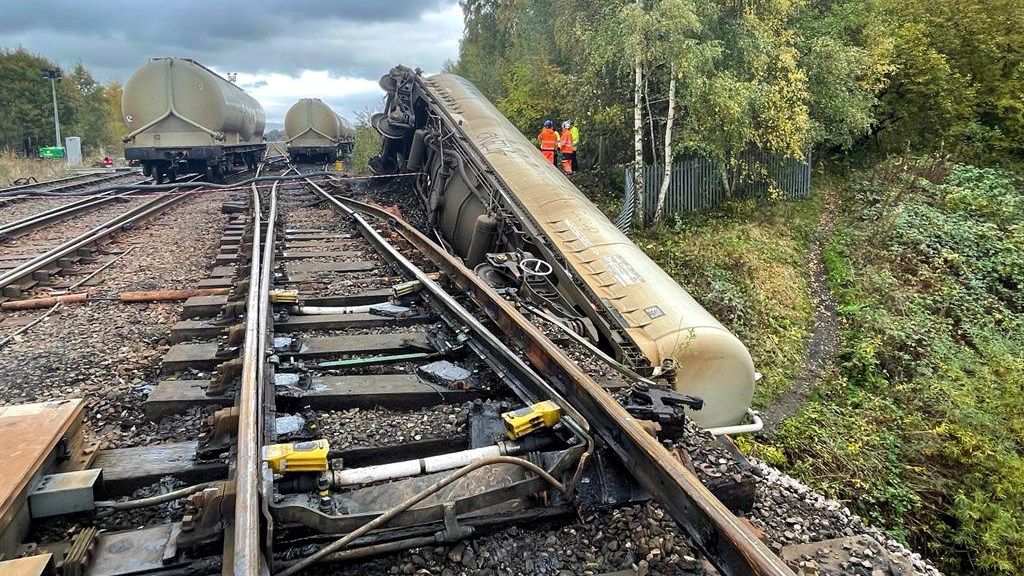Thursday 27 Oct 2022
Complex recovery continuing one week on from Carlisle train derailment
- Region & Route:
- North West & Central
- | North West & Central: North West
Engineers are continuing a complex operation to recover several freight wagons which derailed a week ago in Carlisle.
The derailment involved one locomotive hauling 14 wagons, each filled with 80 tonnes of powdered cement, as it travelled between Clitheroe and Carlisle on Wednesday 21 October.
Five of the wagons derailed shortly after 8pm at Petteril Bridge Junction.
Today (Thursday 27 October) Network Rail has released trackside footage of the recovery scene.
Of the five wagons which came off the tracks, two have been righted on the rails, and the remaining three will need to be lifted out by crane.
Before that can be done specialist contractors have been carefully emptying the wagons of all their cement – so each wagon's 20 tonne weight can be lifted safely.
More than 110 tonnes of cement has been extracted from the five affected wagons so far. It’s estimated all of the material will be emptied from them by the start of next week.
The Environment Agency is continuously monitoring that work and there have been no spillages into the river Petteril during the recovery process.
Meanwhile, rail replacement buses will continue to keep passengers on the move for the foreseeable future with train lines expected to be closed well into November.
This is impacting all services which run on the Tyne Valley line between Carlisle and Newcastle and the Settle to Carlisle line between Carlisle, Appleby and Skipton.
It’s recommended passengers should check www.nationalrail.co.uk or with train operator for the latest travel information.
Phil James, Network Rail’s North West route director, said: “I’d like to once again thank people for their patience while we continue our difficult work to recover the derailed freight wagons.
“We’re working with multiple agencies to get to a point where the recovery operation can end and our major railway repairs can begin. There is still a lot of work to be done until we get to that point though, so I’d encourage passengers to check National Rail Enquiries if they are planning to make any journeys through the area over the next several weeks.”
Kerry Peters, regional director for Northern, said: “We continue to work closely with Network Rail to minimise disruption for our customers while the recovery operation takes place. Customers should still check before they travel and plan for longer journey times. We will share updates on our website and via social media when they become available.”
Clearing up the aftermath of the derailment continues to be complicated by several factors.
This includes working in the difficult terrain where the 100 tonne wagons came to rest.
To account for the unstable ground conditions, plans are still being finalised for the transportation and construction of the large crane needed to lift the wagons so they can be taken away by rail accident investigators.
An initial report published by the Rail Accident Investigation Branch found that a fault with a train wheel was the most likely cause of the derailment.
Network Rail has visited nearby properties and will write to residents in due course with more details of how the recovery and repair work could impact them.
Contact information
Passengers / community members
Network Rail national helpline
03457 11 41 41
Latest travel advice
Please visit National Rail Enquiries
Journalists
Network Rail press office - North West & Central Region
0330 854 0100
NWCmediarelations@networkrail.co.uk
About Network Rail
We own, operate and develop Britain's railway infrastructure; that's 20,000 miles of track, 30,000 bridges, tunnels and viaducts and the thousands of signals, level crossings and stations. We run 20 of the UK's largest stations while all the others, over 2,500, are run by the country's train operating companies.
Usually, there are almost five million journeys made in the UK and over 600 freight trains run on the network. People depend on Britain's railway for their daily commute, to visit friends and loved ones and to get them home safe every day. Our role is to deliver a safe and reliable railway, so we carefully manage and deliver thousands of projects every year that form part of the multi-billion pound Railway Upgrade Plan, to grow and expand the nation's railway network to respond to the tremendous growth and demand the railway has experienced - a doubling of passenger journeys over the past 20 years.
Follow us on Twitter: @networkrail
Visit our online newsroom: www.networkrailmediacentre.co.uk

